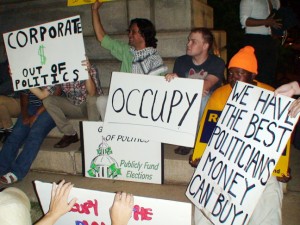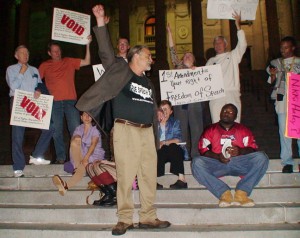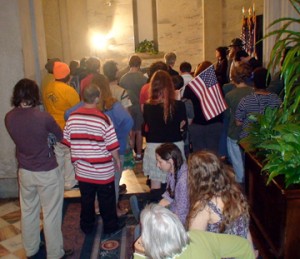Category Archives: National News/Commentary
Walmart runs for president!
 In the immortal words of Mitt Romney, “Corporations are people, my friend.”
In the immortal words of Mitt Romney, “Corporations are people, my friend.”
Unlimited corporate spending on elections is the driving force in our democracy. Yet, there is a growing movement in this country to deny corporations the rights afforded to them by the Supreme Court of the United States. Los Angeles passed a resolution declaring that corporations are not people and money isn’t speech.
South Carolina Democrats want to put a resolution on the ballot asking the public to vote on corporate personhood. There are even people who would blame the lingering recession and growing inequality in our society on major corporations.
That is why, today, I am officially announcing my candidacy for president of the United States. It’s time to take a stand and fight for those who have come under so much attack in recent months: the 1 percent. They need a strong voice in this race, and as America’s largest private employer and the world’s largest retailer, with over $480 billion in revenue in 2010, I am that voice.
Some might scoff at such a notion, since no major corporation has ever even been elected to Congress. But this is America – where corporations are considered people and any retail conglomerate can grow up to be president.
Please take a moment to check out my web site.
SCANA skates on taxes
By Brett Bursey
SC Progressive Network
South Carolina’s only Fortune 500 company, SCANA, paid less than 1/10th of one percent in state income taxes between 2008 and 2010, according to a new study. In 2009, SCANA paid no taxes on over a half-billion dollars in profit.
Citizens for Tax Justice just released the study “Corporate Tax Dodging in the Fifty States, 2008-2010” which found that 68 consistently profitable Fortune 500 companies paid no state corporate income tax in at least one of the last three years. The 265 companies profiled in the study made a total profit of $1.329 trillion, and paid an average of 3 percent state corporate income tax.
SCANA paid $1 million in taxes on $1.590 billion in profit during the three years the study covers.
SCANA Corporation is a $9 billion Fortune 500 energy-based holding company, based in Cayce, SC, whose businesses include regulated electric and natural gas utility operations and other energy-related businesses. SCANA’s subsidiaries serve approximately 610,000 electric customers in South Carolina and more than one million natural gas customers in South Carolina, North Carolina and Georgia.
According to the Sunlight Foundation’s new Influence Explorer web site, SCANA made $677,835 in campaign contributions (73 percent to Republicans) and paid $3,340,000 to their fleet of lobbyists during those three years.
While South Carolina’s corporate tax rate of 5 percent is lower than in 39 other states that tax corporate income, South Carolina’s most profitable company is paying only .02 percent on their profits.
Someone please tell Gov. Nikki Haley and the Taxed Enough Already crowd that SCANA’s corporate stockholders are laughing at them — all the way to their bank in the Cayman Islands.
SC immigration law is inhospitable
By Jo-Dee Robinson
Summerville, SC
I am wearing an orange ribbon today because I am afraid. I am a citizen and I am afraid. I fear the change of heart that happens when we legitimize racism in a law such as Senate Bill 20.
I am American born, but I am a Latino. My parents, who immigrated from Cuba, have been proud taxpaying citizens far longer than most of the voices in our current immigration debate.
Yet very often in a state known for its Southern hospitality, the moment I speak Spanish, I am treated differently. The new S.20 immigration law will mean for my family of citizens that we will run the risk of being profiled, detained and investigated because of the color of our skin and our accents. Yet I truly doubt that my Anglo husband will be asked for his papers.
What will happen the day my elderly mother visits us and we encounter the police? I fear that should she leave her license at home, she will be locked up for status investigation and I for “transporting and harboring,” a felony.
First of all, I don’t have time for all that, and neither do our local police who bounce from one service call to another protecting our communities. I don’t want them all tied up at the jail; I want them patrolling my street.
But what I am really concerned about is what happens in the hearts of all of us after that encounter. All of us will suffer a blow to our dignity. You strip me of my identity and sacred worth when you racially profile me. And by removing the ethical fences that resist racial profiling, you taint the dignity of our police officers who work so hard to do their job in a moral and ethical manner.
This kind of encounter that will be law on Jan. 1 is dehumanizing and will be experienced repeatedly by those who look and sound different. Written in between the lines of S.20, and I fear soon on our hearts, is the growing sentiment that says, “If you are foreign, we don’t want you.”
Yes, we have pressing need to address our immigration issues, but regardless of where you are on the position of immigration, certainly you do not intend to send a message to our immigrant citizens and legal residents that they are no more than a profile. Our state still has not healed from the scars of racism, and I fear that S.20 will tear open and re-infect those wounds, while creating new ones.
I was always taught growing up that America is a melting pot. Let’s be honest. Unless we are Native American, we are all immigrants, invaders, or whatever term we wish to use nowadays. As I wear my orange ribbon, I am asking for a better way.
What I am asking in the midst of my fear of S.20 is can we, for a moment, set aside our labels and just be human?
It is no longer a question of law, but of heart. Ultimately, it is our Southern hospitality that is on trial.
Perk up the economy
By Hoyt Wheeler
Columbia, SC
Why Occupy Columbia? In short, because trickle- down economics has it all wrong. Instead of an economic system in which wealth drips down from the wealthy to everyone else, we should have one in which wealth in the lower reaches of the economy percolates up to enrich the entire economy. Increased demand for goods from millions of American consumers can come only from increased consumer confidence. Increased confidence can come only from higher wages, greater security in old age, and a lack of fear of financial devastation from health problems.
It is the failure of trickle-down economics, along with the failure to sufficiently regulate the financial manipulations of Wall Street, that have prompted the Occupy movement.
The problems in the American economy are not difficult to see. The average American worker’s pay, after inflation, has been essentially flat since 1980, in spite of the economy doubling in size. The unemployment rate hangs stubbornly high at around 9%. The national poverty rate in 2010 was 15.3%, up from 14.3% in 2009, and 46.2 million Americans were living in poverty, up from 42.9 million. Families with young children have a 37% poverty rate, the highest number on record.
In contrast to the situation of the vast majority of Americans, the wealthiest among us are doing quite well. The wealthy are richer than ever, taking home the largest slice of wealth and income in the last 75 years (over 40%), and paying the lowest rate of taxes in 30 years. CEO salaries went up an average of 23% between 2009 and 2010, compared to an increase of 0.5% for the average employee. It is clear that the rich are getting richer. Wealth has become highly concentrated. What is especially offensive is that the fat cat denizens of Wall Street, whose irresponsible behavior is chiefly responsible for a massive financial crisis, have been bailed out with our tax money. For more facts underlying the current protests, see businessinsider.com.
So, what is to be done? The answer of the Republicans and conservative economists is to let the market work its magic. The fact that the market often produces disastrous results for the majority of our citizens is of no consequence, since it is believed with religious fervor that any attempt to interfere with its sacred “invisible hand” will only make matters worse. The historical record reveals, however, that unfettered and unregulated markets have a disagreeable tendency to have periodic crises that produce great suffering by the general public.
Assuming that we can adopt policies to alleviate the unfortunate effects of our economic system, what might these policies be? Obviously, it would help to increase the demand for labor. But labor demand is derived from the demand for its products. To achieve greater demand for products means putting greater financial resources into the hands of consumers, and their having willingness to spend them. Cutting taxes is always a popular method of doing this, but it involves cutting services that are more needed in times of economic distress, and are also needed to have long term prosperity. Cuts in education are a classic example of this.
Fortunately, the money is available. The huge hoards of cash being held by U.S. companies need to be placed in circulation for the economy to recover. There is currently a record $1 trillion squirreled away by corporations. If this large stash of funds were put in circulation, especially in the form of wages, it would stimulate the economy as well as make for better lives for millions of workers.
During the Great Depression the U.S. government adopted a number of policies that had the purpose of increasing demand for products and therefore increasing the demand for labor. In the National Labor Relations Act of 1935, Congress declared that: “The inequality of bargaining power between employees who do not possess full freedom of association or actual liberty of contract, and employers who are organized in the corporate or other forms of ownership association… tends to aggravate recurrent business depressions, by depressing wage rates and the purchasing power of wage earners in industry… It is hereby declared to be the policy of the United States to…encourage the practice and procedure of collective bargaining….” Unionized workers earn higher wages, have better health insurance and better pensions. Yet, this purpose has been frustrated in recent years by the lack of teeth in the law and the inability to strengthen it to respond to modern conditions. To the contrary, at present the National Labor Relations Board, which administers this law, is under vigorous attack by the political servants of American capital.
The enormous political power of Wall Street prevented the adoption of sensible reforms in the financial system, such as the “Volker Plan” that would have separated traditional banking and speculative financial activity. This should be changed. There are a number of changes in the tax code that would make for a more equitable system as well as produce needed revenue. A small tax on financial transactions is only one of these.
It should not be surprising that on New York’s Wall Street, and in Columbia, and a number of cities across the country, Americans are taking to the streets. The people are finding their voice.
Hoyt Wheeler is Distinguished Professor of Management Emeritus, Moore School of Business, University of South Carolina. His publications include The Future of the American Labor Movement and Industrial Conflict: An Integrative Theory. He is a Co-Chair of the SC Progressive Network. The opinions expressed here are his own and do not necessarily reflect the views of the Moore School of Business, the University of South Carolina or the SC Progressive Network.
Solicitor drops charges against Occupy Columbia protesters
Citizens united win in South Carolina!
In case you missed it, here are video clips and photos of the SC Progressive Network‘s support of the Occupy Columbia movement. For the most current Network news and events, join us on Facebook.
Occupy Columbia protesters defy Gov. Haley’s orders to leave State House grounds at 6pm.
SC Progressive Network issues call for citizens to challenge Gov. Haley’s order. Some 300 people showed up for a spirited rally at the State House. Nobody was arrested. Big night for free speech in South Carolina.
SC Progressive Network Director declares victory with Rep. Gilda Cobb-Hunter, the only legislator to risk arrest in defense of the First Amendment.
Photos of Gov. Nikki Haley’s press conference Nov. 16 announcing the eviction of the Occupy Columbia protesters, and the arrest of 19 two hours later.
Photos of a rally organized by the SC Progressive Network Nov. 21 challenging Gov. Haley’s orders.
Citizens United to Challenge Gov. Haley’s Order
The SC Progressive Network is asking South Carolina citizens to gather at the State House on Monday, Nov. 21, to challenge Gov. Nikki Haley’s order against protesting on the grounds after 6pm.
“We are urging citizens who believe that our First Amendment right to petition our government doesn’t end at sunset to join us at the State House from 6 to 7pm on Monday,” said Network Director Brett Bursey. “We will peacefully protest on the grounds, and are inviting legislators to join us in taking a stand for free speech in South Carolina.”
Gov. Nikki Haley orders protesters off the State House grounds at a Nov. 16 press conference. Two hours later, 19 Occupy Columbia activists are arrested.
The Network is a 16-year-old statewide coalition of advocacy organizations and grassroots activists that promotes democratic reforms, including reducing the influence of money in politics. “We do not believe that money is free speech, that corporations are people, or that the Occupy Wall Street protests don’t have a clear message,” Bursey said.
Network Co-chair Virginia Sanders said the the prohibition against protesting after 6pm reminds her of Columbia’s old Jim Crow practice of running the last bus to the black communities before dark. “The governor is saying that if I work until 5pm, my opportunity to protest her decisions will last about 15 minutes,” Sanders said.
Sanders’ remembers 1961, when 187 black students were arrested for protesting racial segregation on the State House grounds. The US Supreme Court threw out the conviction, ordering that the state could not “make criminal the peaceful expression of unpopular views.”
Participants in Monday’s protest will not be arrested unless they refuse to leave after being ordered to do so by the Bureau of Protective Services.
Neither the Governor’s Office, the Dept. of Public Saftey or the Bureau responded to repeated requests Friday for clarification of the new limits on First Amendment expression on the State House grounds. “It’s my guess that they don’t have a clue how to enforce an illegal order,” Bursey said.
“If I can’t stand on the State House grounds with a sign that expresses my opinion about how our democracy has been hijacked by corporate interests, I’d rather be in jail,” he said.
Don’t let special interests hijack tax reform, again
By Michael Fanning
South Carolina stands at a moment of crisis. Our state has the fourth-highest unemployment rate in the nation, at 11 percent. While the recession played a role, much of the blame lies with our convoluted and antiquated tax code, which promotes selected special interests, unfairly burdens the average taxpayer and discourages a competitive business environment.
Sleazy special-interest tax exemptions and loopholes are killing our state. With more than 80 sales tax exemptions and hundreds more service tax exemptions, we exempt more revenue than we collect — leaving our state broke, even as our sales tax rate ranks among the highest in the country.
A non-partisan report commissioned by the Legislature said we could lower our sales tax rate from 6 percent to 4.5 percent by removing some of these special interest exemptions — or to 3 percent by eliminating them all.
Act 388, which most legislators now agree was a mistake, shifted a property tax burden of hundreds of millions of dollars onto our business community. Meanwhile, the income tax rate is among the nation’s highest (higher even than Massachusetts), but special-interest exemptions and loopholes leave 41 percent paying no income taxes.
Over the past 22 months, a grassroots organization named ROAR (Reduce Our Awful Rates) has held more than 220 town hall meetings across the state. Everyone, from tea partiers to liberals, from businessmen to educators, sends the same message: We desperately need real, honest and comprehensive tax reform. Reform that (1) lowers overall tax rates, (2) restores the stability of South Carolina’s tax base (sales, income and property taxes) by eliminating unfair exemptions, (3) increases our state’s competitiveness, attracting businesses and promoting job growth, (4) creates a fair, honest and transparent code and (5) helps our state balance its budget while providing core services.
ROAR’s building momentum is forcing the hands of state policy makers. A House Republican study committee, a bipartisan Senate study committee and Gov. Nikki Haley are drafting plans to address the issue. Unfortunately, we all know the corrupting influence of special interests rarely allows our state government to function as it should. As the legislative session approaches, these groups are presenting their own disingenuous “reform” plans, benefitting themselves at the expense of the taxpayer.
But rarely do we get advance notice when special interests begin to cut their backroom deals with legislators. Recently, the S.C. School Boards Association presented a plan to increase taxes by $1 billion and further complicate our tax code — and called it tax reform. The plan mentions sales tax exemptions only in passing, ignores Act 388 entirely and leaves our income tax structure untouched and unjust. Our core services do need a stable revenue base, but this plan is no better than that of any of the other special interests: Each crafts special tax policies just for itself, ignoring the consequences on the state as a whole.
These are the tired old politics of division: Raise your taxes to pay for what we want — our special exemptions and our desired services. This selfish behavior is what got us into this tax mess.
These vested interests tell us they want change — if it benefits them. They call for reform — that includes more exemptions and higher taxes. South Carolinians of all walks of life and across the political spectrum demand real, honest tax reform. As the momentum builds, armies of moneyed lobbyists seek to divert it to their advantage.
South Carolina has the nation’s15th-highest sales tax, 13th-highest income tax for top earners, fifth-highest business property-tax assessments — but refuses to talk about the one thing that could unite us: reducing the billions of dollars in special-interest tax exemptions.
Reject these special-interest wolves in sheep’s clothing. Refuse to support any legislation that perpetuates a system benefiting the few at our expense. Let this moment of real crisis become a moment of real change. Stand united. Start ROARing.
Dr. Fanning, who has served the past 14 years as executive director of the Olde English Consortium in Chester, is the founder of the grassroots organization Reduce Our Awful Tax Rates. Contact him at FanningROAR@gmail.com.
U.S. Department of Justice challenges South Carolina’s immigration law
Complaint cites conflict with federal enforcement of immigration laws
WASHINGTON – The Department of Justice challenged South Carolina’s recently passed immigration law, Act No. 69, in federal court today.
In a complaint, filed in the District of South Carolina, the department states that certain provisions of Act No. 69, as enacted by the state on June 27, 2011, are unconstitutional and interfere with the federal government’s authority to set and enforce immigration policy, explaining that “the Constitution and federal law do not permit the development of a patchwork of state and local immigration policies throughout the country.” South Carolina’s law clearly conflicts with the policies and priorities adopted by the federal government and therefore cannot stand.
South Carolina’s law is designed to further criminalize unauthorized immigrants and, like the Arizona and Alabama laws, expands the opportunity for police to push unauthorized immigrants towards incarceration for various new immigration crimes by enforcing an immigration status verification system. Similar to Arizona’s S.B. 1070 and Alabama’s H.B. 56, this law will place significant burdens on federal agencies, diverting their resources away from high-priority targets, such as terrorism, drug smuggling and gang activity, and those with criminal records. In addition, the law’s mandates on law enforcement will also result in the harassment and detention of foreign visitors and legal immigrants, as well as U.S. citizens, who cannot readily prove their lawful status.
“Today’s lawsuit makes clear once again that the Justice Department will not hesitate to challenge a state’s immigration law, as we have in Arizona, Alabama and South Carolina, if we find that the law interferes with the federal government’s enforcement of immigration,” said Attorney General Eric Holder. “It is understandable that communities remain frustrated with the broken immigration system, but a patchwork of state laws is not the solution and will only create problems. We will continue to monitor the impact these laws might have on our communities and will evaluate each law to determine whether it conflicts with the federal government’s enforcement responsibilities.”
“DHS continues to enforce federal immigration laws in South Carolina in smart, effective ways that focus our resources on criminal aliens, recent border crossers, repeat and egregious immigration law violators and employers who knowingly hire illegal labor,” said Department of Homeland Security Secretary Janet Napolitano. “This kind of legislation diverts critical law enforcement resources from the most serious threats to public safety and undermines the vital trust between local jurisdictions and the communities they serve, while failing to address the underlying problem: the need for comprehensive immigration reform at the federal level.”
The department filed the lawsuit after consultation with the South Carolina attorney general and South Carolina law enforcement officials. The suit was filed on behalf of the Departments of Justice, Homeland Security and State, which share responsibilities in administering federal immigration law. The department will soon request a preliminary injunction to enjoin enforcement of the law, parts of which go into effect on Jan. 1, 2012, arguing that the law’s operation will cause irreparable harm.
The Justice Department previously challenged S.B. 1070 and H.B. 56 on federal preemption grounds. The department continues to review immigration-related laws that were passed in Utah, Indiana and Georgia. Courts have enjoined key parts of the Arizona, Alabama, Georgia and Indiana state laws and temporarily restrained enforcement of Utah’s law.





